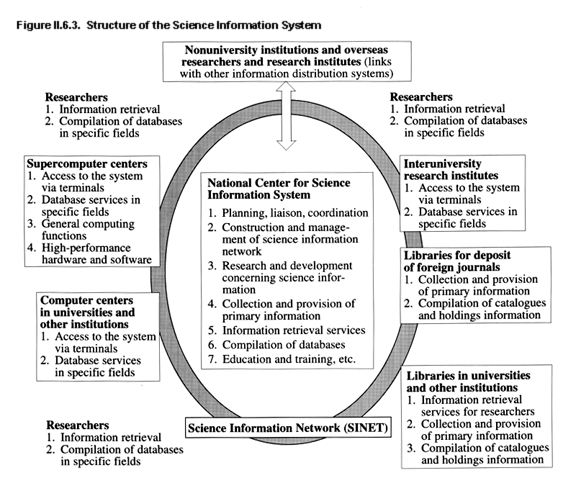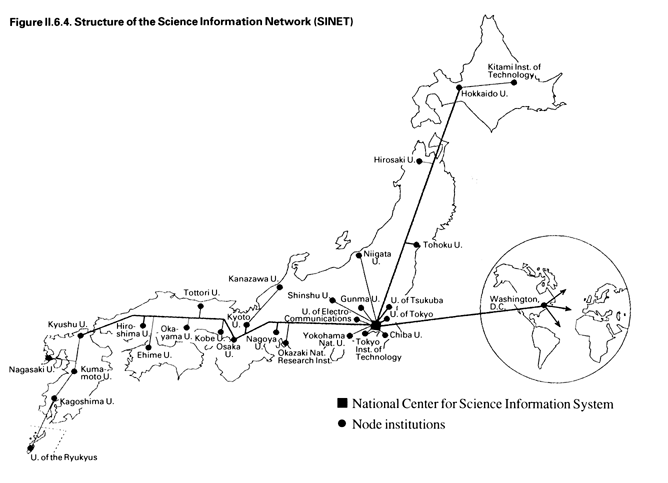| Home > Policy > White Paper, Notice, Announcement > White Paper > JAPANESE GOVERMENT POLICICIES IN EDUCATION, SCIENCE AND CULTURE 1994 > PART II Chapter 6 Section 5 1 | ||
The dramatic expansion and advance of scientific research has been paralleled by rapid growth in the amount of science information produced as a result of that research. The variety of information formats used has also expanded to include text, numerical data, sound, and visual images, as well as multimedia, which integrates all these formats. There is an urgent need for the establishment of a science information distribution system as part of the scientific research infrastructure of universities and other institutions in order to provide rapid and secure access to science information and disseminate the findings of scientific research in Japan and overseas.
The Ministry of Education, Science and Culture is actively developing a comprehensive nationwide science information system to link libraries, computer centers, and other facilities in national, local public, and private universities and other institutions with the National Center for Science Information System as the core institution ( Figure II.6.3 ).

The National Center for Science Information System is constructing and managing the Science Information Network (SINET), which connects universities and other institutions with high-speed data links, and is providing information retrieval services ( Figure II.6.4 ). In fiscal 1994 the center significantly increased the speed at which science information could be distributed by upgrading main trunk domestic links to 6 Mbps and the international link with the United States to 2 Mbps. ("Mbps" stands for "megabits per second" and is a unit of transmission speed on a circuit. A megabit is 1 million bits, which is roughly equivalent to 50,000 kanji characters.)

Since fiscal 1987 the Ministry of Education, Science and Culture has been promoting the development of campus information networks (campus LANs) to connect various computers and terminals located in laboratories and other research facilities within universities and other institutions. The supplementary budget for fiscal 1993 enabled the dramatically accelerated development of campus LANs, and by the end of fiscal 1994 systems were to be installed in all national universities and interuniversity research institutes (with the exception of five national universities and interuniversity research institutes that were to be relocated).
Campus LANs accelerate the flow of information, including text, numerical data, and visual images, throughout universities. Moreover, campus LANs have high-speed links to SINET, enabling researchers to exchange research information with researchers outside their universities without leaving their laboratories.
University libraries are an important part of the base of scientific research and education in universities and other institutions. In December 1993 the Committee on Science Information of the Science Council submitted a report titled "Reinforcement and Upgrading of Functions of University Libraries," in which the committee recommended specific measures concerning the establishment of further enhanced services in step with the growing use of information technology and other trends.
The Ministry of Education, Science and Culture is working to enrich university libraries by enhancing information retrieval and document delivery services, developing electronic information resources, and improving access on weekends and for nonuniversity users. The Ministry is also improving new information services, such as CD-ROM retrieval through campus LANs. The National Center for Science Information System, meanwhile, is improving the speed and efficiency of library services through the development of a system whereby libraries in universities and other institutions nationwide will create a union catalogue of their holdings and an interlibrary loan (ILL) system whereby university libraries will process ILL operations via on-line links.
Databases provide researchers in universities and other institutions with speedy and secure access to scientific information. The Ministry of Education, Science and Culture is promoting the development and enhancement of databases by encouraging the compilation of databases in national universities and other institutions, as well as the National Center for Science Information System. The Ministry also subsidizes the compilation of databases by academic societies and groups of researchers through the grants-in-aid for scientific research system (see chapter 11, section 4).
Publication of the findings of scientific research contributes to the promotion of science and the expansion of international exchange. The Ministry of Education, Science and Culture subsidizes publication-related activities, such as the publication of journals of academic societies and scholarly works and the translation of scholarly works into foreign languages, through the grants-in-aid for scientific research system. The Ministry also sponsors the "University and Science" symposiums, which provide opportunities to inform the general public about original and pioneering research achievements. In fiscal 1994 the Ministry began subsidizing symposiums organized by academic societies and private scientific research institutes to inform and educate the general public and young people about the latest developments in relevant fields.
The standardization and clarification of diverse and complex scientific terms is vital to the advancement and dissemination of science. To date the Ministry of Education, Science and Culture has compiled scientific terms and edited and published 30 collections of scientific terms in as many fields, with the cooperation of academic societies. In fiscal 1993 the Ministry compiled linguistics terms.
| Back to Top | MEXT HOME |